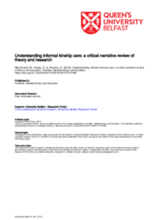Abstract Many children are cared for on a full-time basis by relatives or adult friends, rather than their biological parents, and often in response to family crises. These kinship care arrangements have received increasing attention from the social science academy and social care professions. However, more information is needed on informal kinship care that is undertaken without official ratification by welfare agencies and often unsupported by the state. This article presents a comprehensive, narrative review of international, research literature on informal, kinship care to address this gap. Using systematic search and review protocols, it synthesises findings regarding: (i) the way that informal kinship care is defined and conceptualised; (ii) the needs of the carers and children; and (iii) ways of supporting this type of care. A number of prominent themes are highlighted including the lack of definitional clarity; the various adversities experienced by the families; and the requirement to understand the interface between formal and informal supports. Key messages are finally identified to inform the development of family friendly policies, interventions, and future research.
Most of the 57 reviewed papers report on research conducted across the USA, followed by the UK, with a small number of studies conducted in Canada, Australia and sub-Saharan Africa. All but one were published between 2000 and 2014.

